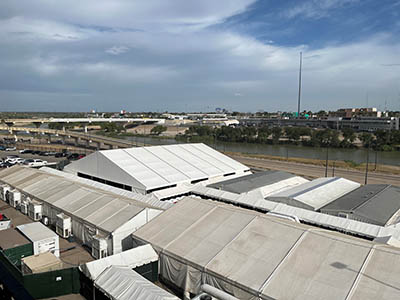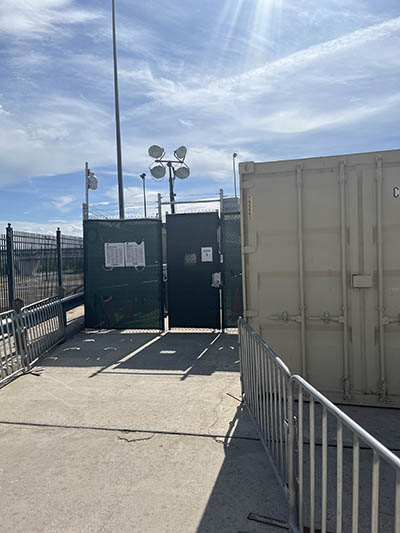Last week, I traveled to Laredo, Texas, to represent a client, a Central American woman seeking asylum under the Migrant Protection Protocols (MPP, or “Remain in Mexico” program), for her final asylum hearing.
The trip was significant both because it meant my client would be one of the very few asylum seekers to have counsel in MPP proceedings, and because it provided an opportunity to observe the current reality of the Remain in Mexico program under the Biden administration. My client spent nearly half a year trapped in Mexico under the Biden administration’s MPP policy, which requires people to wait in dangerous conditions in Mexico while seeking asylum in the United States. She got sick from COVID twice during her time in Mexico. She suffered from high blood pressure, insomnia, and anxiety. When she was allowed to briefly enter the United States for preliminary hearings before her asylum trial, she expressed fear of returning to Mexico but was nonetheless returned to face more harm. Fortunately, my client ultimately prevailed and was granted asylum at her long-awaited immigration court hearing. In many ways, she was the exception, not the norm.
Recently, reports have come out that the Biden administration is having cold feet about ending this dreadful policy, despite a landmark decision by the Supreme Court which affirmed the administration’s authority to do so. This hesitation is alarming, particularly as the administration has continued subjecting people to MPP despite knowing they will be at significant risk of harm in Mexico. NIJC bore witness to rampant due process and human rights violations when the administration implemented its “MPP 2.0” program in 2021, after a federal court ruling—now overturned—halted Biden’s initial plans to end the Trump-era program. Here are observations from my recent experience in an MPP court, witnessing my client endure the ongoing harm of MPP even as the powers that be in Washington D.C. weigh whether to continue such cruelty.
Access to counsel continues to be abysmal under MPP 2.0
Since MPP resumed, a very low percentage of asylum seekers who appeared before the Laredo MPP court had counsel. Nationwide, five percent of asylum seekers in Biden’s MPP program have had an attorney by their side—a drop from the nearly eight percent representation rate during the Trump administration.
During my trip, in addition to the client I came to represent, I assisted an unrepresented Honduran mother who was scheduled for her final asylum hearing on the afternoon of the day I met her. She had a credible and compelling asylum claim. But, she did not have an attorney when she filed her application for asylum, resulting in the types of mistakes and misunderstandings that often can snowball into a denial in the asylum hearing. Despite our two hours of preparation together, she was denied asylum that afternoon. Had she had an attorney throughout her case, I am confident the outcome would have been different. Aside from the very few asylum seekers who connect with pro bono counsel, the only people in MPP who have a chance at winning asylum are those lucky enough to have a robust support network in the United States with the resources to hire a private attorney, which typically cost $10,000 or more.
Client communication is nearly impossible under MPP, while asylum seekers languish in shelters in Mexico
The challenges I had to overcome with communication with my client in Mexico were significant. Living in Mexico meant a lack of a consistent cell signal during lengthy legal calls as she tried to convey her story and help me understand her claim. My client never had privacy or a quiet background during our calls since she was living in a shelter. She was largely unavailable to speak during the work day because she needed to work to support herself, which meant I spoke with her countless times on weeknights after I put my own child to bed. This isn’t normal or sustainable work, even for legal professionals who know how to move mountains in this asylum landscape.
Calls were inherently harder because my client was in precarious circumstances in Mexico. She stayed in a shelter where phones were often confiscated by shelter staff. There were daily tensions between the shelter staff and asylum seekers. Men were forced to stay out during the day and could only stay in the shelter at night to sleep, under purported “security” concerns. Many asylum seekers complained that they were mistreated by staff and that food was scarce.
Asylum seekers cycle in and out of detention, as they await elusive fear screenings
To be in MPP means you experience multiple stretches of immigration detention, which is not only inhumane but highly inefficient. My client had previously asked to receive an interview where she could express her fear of returning to Mexico; if the immigration officer interviewing her found her fear to be credible, she could be granted a reprieve from being returned there and instead wait for her asylum case to play out in the United States. Though I had entered an appearance as her attorney, I received no notice of the interview when it happened. My client was interviewed alone and detained, on a Sunday afternoon, and was denied and returned to Mexico once again.
During my visit, I attended some hearings for people who, like my client, expressed fear of returning to Mexico. Even as a licensed attorney with pre-approval from the U.S. government to provide support to unrepresented people, I was almost denied permission to observe the hearing. Security guards put me in a waiting room for over an hour without information about why I was not being allowed into the courtroom. After much advocacy and patience, I was finally allowed into the structure, a trailer repurposed as a courtroom, where chairs were bolted to the floor. Men ranging in age from 29 to 50 spoke through their masks to an immigration judge located across town who was appearing virtually. For these asylum seekers, the judge was but a small figure on a TV screen.
During this mass hearing, the judge repeatedly asked whether everyone had received the “list” of legal service providers. All the asylum seekers appeared confused. The “list,” written in English, contained a single organization’s name. The judge finally moved on. Later, all the men replied that yes, they had a fear of returning to Mexico, and that yes, they requested an interview to express that fear. Unfortunately, their fear was treated as a perfunctory matter. The judge stated that they could wait, in detention, up to a week for their interview. Even when people decline an interview, they are held in detention for at least three to four days due to processing.
MPP 2.0 hearings occur in a hyper-militarized, remote location
To enter MPP 2.0 court in Laredo requires walking through a giant deserted parking lot under a highway ramp next to the Rio Grande. There are three levels of security at which you have to present proof that you are an attorney and that your client has court scheduled. This is more security than used in most courtrooms in the United States, let alone in a setting where individuals are exercising their right to seek asylum. After passing through the third airport-style security checkpoint, security guards took my state ID and bar card, which they kept the entire time I was there as is common practice at a detention center.
Everywhere I turned, there were six uniformed guards standing around. A guard was required to escort me from room to room. I couldn’t use the port-a-potty without a guard walking me there and waiting for me outside.
Most asylum seekers processed in MPP’s Laredo sector are not returned to the nearest Mexican border city, Nuevo Laredo. That’s because Nuevo Laredo is both dangerous and has scarce potable water. Instead, my client stayed in Monterrey, Mexico, which recently had its own shortage of water. For a 1:30 p.m. hearing, my client took the official MPP bus that departed Monterrey at 3 a.m. After a three-hour drive and extensive processing at the border, we were allowed to meet for two hours before her hearing.
During my client’s hearing, one court staff member commented that I was the first attorney they had witnessed attend a hearing in person. The hearing itself occurred in a six-foot-by-20-foot shipping container turned into a courtroom, with a small window. The noisy air conditioning unit turned on and off throughout the hearing, which, while distracting, was necessary because it was 104 degrees Fahrenheit in Laredo. After a difficult three-hour hearing, the judge finally recognized that my client faced persecution, torture, or death in her home country.
Her asylum win brought much-needed joy in a sobering moment in U.S. asylum history. While I am pleased I was able to intervene in the case of one asylum seeker stranded in MPP, I lament the many who remain stranded in this program. The Biden administration is choosing to continue this cruelty rather than pursuing protection. It is time for the administration to instead choose to protect human rights and restore the U.S. asylum system.
Take Action: Sign the petition calling on President Biden to end Remain in Mexico.
Colleen Kilbride is a senior attorney at the National Immigrant Justice Center.


